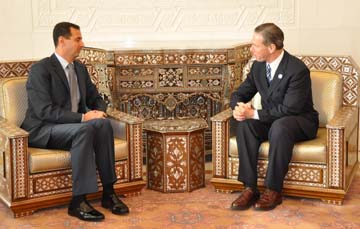September 4, 2013
Dorchester’s two representatives in Congress appear unlikely to support a military intervention in Syria, as their former colleague in the Massachusetts delegation, Secretary of State John Kerry, is pressing lawmakers to act. The US says that the Syrian government, which is in a struggle with rebels, has attacked its own civilians with chemical weapons.
Capitol Hill leaders – GOP House Speaker John Boehner and the two Democratic chiefs, Minority Leader Nancy Pelosi and Senate Majority Leader Harry Reid – say they support President Obama’s push for action in the Middle East. But others, like Congressmen Stephen Lynch (D-South Boston) and Michael Capuano (D-Somerville), said they still have questions about a possible strike and are leaning against voting for its authorization.
Lynch, who shares representation of Dorchester with Capuano, has a unique perspective: He met the Syrian president, Bashar al-Assad, during a 2009 visit, and he frequently travels to the Middle East as a member of the House Oversight Subcommittee on National Security and Foreign Affairs.
 Lynch Meets Assad: Congressman Steve Lynch met with President Bashar al-Assad during a visit to Syria in 2009. Photo courtesy Congressman Lynch's office
Lynch Meets Assad: Congressman Steve Lynch met with President Bashar al-Assad during a visit to Syria in 2009. Photo courtesy Congressman Lynch's office
When he met with al-Assad, they talked about the US embassy in Damascus, which is now closed. There were concerns that it was too close to the street, leaving it vulnerable to a car bomb. Another issue was that the Syrian army was not securing their border, and insurgents were streaming into Iraq and attacking US troops.
“I still don’t believe that simply going to war against Syria, beginning to bomb them, is the right approach here,” Lynch told the Reporter on Wednesday.
A “long list of democracies have decided it is not wise to be actively involved,” Lynch said. The United Nations, NATO, and the Arab League are not involved in the operation, and at least for now, Britain won’t be there either, leaving the US as the only country in charge, Lynch added.
“I spent a lot of time in the Middle East,” Lynch said. “They don’t like us. They don’t support us. I don’t see meaningful democracy in the Middle East, with the exception of Israel. And they decry our involvement over there. Especially in places like Pakistan and recently in Egypt. So now here’s the chance for the Arab League to step up. It’s their own neighborhood, and all of a sudden, they think it’s more appropriate that the United States get involved. I don’t agree with that; I don’t think that’s a healthy relationship.”
In Syria particularly, there are two regimes at war with each other, Lynch said: One with al-Assad, supported by Hezbollah, a terrorist organization, and another filled with rebel fighters affiliated with al Qaeda, which is also a terrorist organization. If the US tries to degrade the military capability of the al-Assad regime, Lynch said, “we inadvertently help al Qaeda.”
When asked about the chemical weapons al-Assad has been said to have unleashed on his own people, Lynch said, “It is indeed a tragedy. But isn’t it an international tragedy? That’s my question.”
He does not doubt al-Assad’s army is responsible for the chemical attacks, he said, but he is concerned about a new standard of US involvement without the U.N. or other international neighbors. “I don’t know where this ends, if this is the new policy,” he said.
His constituents, he adds, are “just sick of” wars in the Middle East: “‘Here we go again, another Middle East country that’s a mess and the United States is now singly responsible for cleaning up while every other country in the region takes a pass.’”
Syria’s circumstances are different from the war in Iraq, which Lynch voted to support in 2002. Saddam Hussein was aggressively attacking other countries, fighting with Iran, invading Kuwait, using chemical weapons on the Kurds, and firing missiles into Israel. There was a “very strong pattern of aggression,” Lynch said, though it turned out Hussein was “bluffing” on the use of weapons of mass destruction.
Capuano echoed Lynch, saying there “has to be a world response. I’m convinced that the Assad regime has committed a war crime.” But Capuano also voiced concerns about potentially helping al Qaeda. “Does it really send the right message?” he said of a strike. “I think all of those questions have to be asked.”
He is a supporter of President Obama, Capuano said. “I want to listen to them, I want to give them the benefit of the doubt.”
But, he added, he doesn’t vote based on political affiliation and friendship “when it comes to war and peace.”
Lawmakers don’t return to Washington D.C. until next week, and Capuano said he is appreciative that the president came to Congress to ask for authorization. The Constitution says only Congress can declare war, he noted. “Democracy is not as neat, not as clean as a dictatorship, but it works much, much better to benefit of all,” he said.
Topics:


